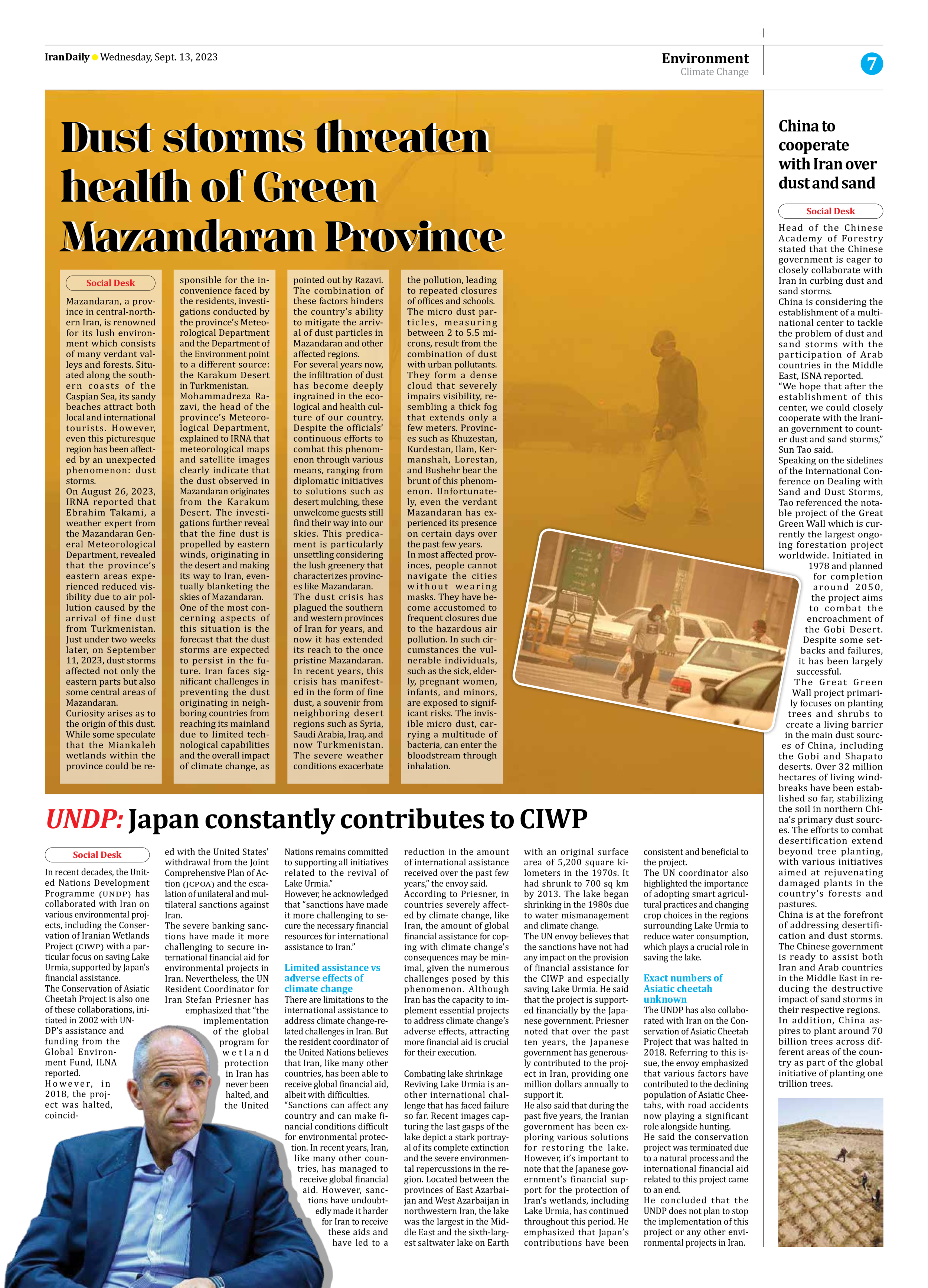
UNDP: Japan constantly contributes to CIWP
In recent decades, the United Nations Development Programme (UNDP) has collaborated with Iran on various environmental projects, including the Conservation of Iranian Wetlands Project (CIWP) with a particular focus on saving Lake Urmia, supported by Japan’s financial assistance.
The Conservation of Asiatic Cheetah Project is also one of these collaborations, initiated in 2002 with UNDP’s assistance and funding from the Global Environment Fund, ILNA reported.
However, in 2018, the project was halted, coincided with the United States’ withdrawal from the Joint Comprehensive Plan of Action (JCPOA) and the escalation of unilateral and multilateral sanctions against Iran.
The severe banking sanctions have made it more challenging to secure international financial aid for environmental projects in Iran. Nevertheless, the UN Resident Coordinator for Iran Stefan Priesner has emphasized that “the implementation of the global program for wetland protection in Iran has never been halted, and the United Nations remains committed to supporting all initiatives related to the revival of Lake Urmia.”
However, he acknowledged that “sanctions have made it more challenging to secure the necessary financial resources for international assistance to Iran.”
Limited assistance vs adverse effects of climate change
There are limitations to the international assistance to address climate change-related challenges in Iran. But the resident coordinator of the United Nations believes that Iran, like many other countries, has been able to receive global financial aid, albeit with difficulties.
“Sanctions can affect any country and can make financial conditions difficult for environmental protection. In recent years, Iran, like many other countries, has managed to receive global financial aid. However, sanctions have undoubtedly made it harder for Iran to receive these aids and have led to a reduction in the amount of international assistance received over the past few years,” the envoy said.
According to Priesner, in countries severely affected by climate change, like Iran, the amount of global financial assistance for coping with climate change’s consequences may be minimal, given the numerous challenges posed by this phenomenon. Although Iran has the capacity to implement essential projects to address climate change’s adverse effects, attracting more financial aid is crucial for their execution.
Combating lake shrinkage
Reviving Lake Urmia is another international challenge that has faced failure so far. Recent images capturing the last gasps of the lake depict a stark portrayal of its complete extinction and the severe environmental repercussions in the region. Located between the provinces of East Azarbaijan and West Azarbaijan in northwestern Iran, the lake was the largest in the Middle East and the sixth-largest saltwater lake on Earth with an original surface area of 5,200 square kilometers in the 1970s. It had shrunk to 700 sq km by 2013. The lake began shrinking in the 1980s due to water mismanagement and climate change.
The UN envoy believes that the sanctions have not had any impact on the provision of financial assistance for the CIWP and especially saving Lake Urmia. He said that the project is supported financially by the Japanese government. Priesner noted that over the past ten years, the Japanese government has generously contributed to the project in Iran, providing one million dollars annually to
support it.
He also said that during the past five years, the Iranian government has been exploring various solutions for restoring the lake. However, it’s important to note that the Japanese government’s financial support for the protection of Iran’s wetlands, including Lake Urmia, has continued throughout this period. He emphasized that Japan’s contributions have been consistent and beneficial to the project.
The UN coordinator also highlighted the importance of adopting smart agricultural practices and changing crop choices in the regions surrounding Lake Urmia to reduce water consumption, which plays a crucial role in saving the lake.
Exact numbers of Asiatic cheetah unknown
The UNDP has also collaborated with Iran on the Conservation of Asiatic Cheetah Project that was halted in 2018. Referring to this issue, the envoy emphasized that various factors have contributed to the declining population of Asiatic Cheetahs, with road accidents now playing a significant role alongside hunting.
He said the conservation project was terminated due to a natural process and the international financial aid related to this project came to an end.
He concluded that the UNDP does not plan to stop the implementation of this project or any other environmental projects in Iran.







